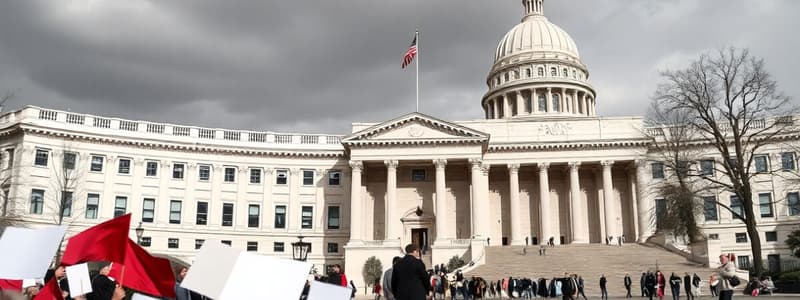Podcast
Questions and Answers
What are common goods?
What are common goods?
Goods that all people may use but that are of limited supply.
Define democracy.
Define democracy.
A form of government where political power rests in the hands of the people.
What is a direct democracy?
What is a direct democracy?
A form of government where people participate directly in making government decisions instead of choosing representatives to do this for them.
What does elite theory claim?
What does elite theory claim?
What is government?
What is government?
What is ideology?
What is ideology?
Define intense preferences.
Define intense preferences.
What are latent preferences?
What are latent preferences?
What is the majority rule?
What is the majority rule?
Flashcards
Common Goods
Common Goods
Goods that everyone can use but are limited in supply, like clean air or national parks.
Democracy
Democracy
A form of government where the power resides with the people, and they have a say in how they are governed.
Direct Democracy
Direct Democracy
A type of democracy where citizens directly vote on laws and policies, bypassing representatives.
Representative Democracy
Representative Democracy
Signup and view all the flashcards
Elite Theory
Elite Theory
Signup and view all the flashcards
Government
Government
Signup and view all the flashcards
Ideology
Ideology
Signup and view all the flashcards
Intense Preferences
Intense Preferences
Signup and view all the flashcards
Latent Preferences
Latent Preferences
Signup and view all the flashcards
Majority Rule
Majority Rule
Signup and view all the flashcards
Social Contract
Social Contract
Signup and view all the flashcards
Supremacy Clause
Supremacy Clause
Signup and view all the flashcards
The Federalist Papers
The Federalist Papers
Signup and view all the flashcards
Three-Fifths Compromise
Three-Fifths Compromise
Signup and view all the flashcards
Unicameral Legislature
Unicameral Legislature
Signup and view all the flashcards
Veto
Veto
Signup and view all the flashcards
Virginia Plan
Virginia Plan
Signup and view all the flashcards
Anti-Federalists
Anti-Federalists
Signup and view all the flashcards
Articles of Confederation
Articles of Confederation
Signup and view all the flashcards
Bicameral Legislature
Bicameral Legislature
Signup and view all the flashcards
Bill of Rights
Bill of Rights
Signup and view all the flashcards
Checks and Balances
Checks and Balances
Signup and view all the flashcards
Confederation
Confederation
Signup and view all the flashcards
Declaration of Independence
Declaration of Independence
Signup and view all the flashcards
Enumerated Powers
Enumerated Powers
Signup and view all the flashcards
Federal System
Federal System
Signup and view all the flashcards
Federalists
Federalists
Signup and view all the flashcards
Great Compromise
Great Compromise
Signup and view all the flashcards
Natural Rights
Natural Rights
Signup and view all the flashcards
New Jersey Plan
New Jersey Plan
Signup and view all the flashcards
Republic
Republic
Signup and view all the flashcards
Reserved Powers
Reserved Powers
Signup and view all the flashcards
Separation of Powers
Separation of Powers
Signup and view all the flashcards
Study Notes
Key Terms
- Common goods: Goods that all people may use but are of limited supply
- Democracy: A form of government where political power rests in the hands of the people
- Direct democracy: A form of government where people participate directly in making government decisions instead of choosing representatives to do this for them
- Elite theory: Claims political power rests in the hands of a small, elite group of people
- Government: The means by which a society organizes itself and allocates authority in order to accomplish collective goals
- Ideology: The beliefs and ideals that help to shape political opinion and eventually policy
- Intense preferences: Beliefs and preferences based on strong feelings regarding an issue that someone adheres to over time
- Latent preferences: Beliefs and preferences people are not deeply committed to and that change over time
- Majority rule: A fundamental principle of democracy; the majority should have the power to make decisions binding upon the whole
- Social contract: An agreement between people and government in which citizens consent to be governed so long as the government protects their natural rights
- Supremacy clause: The statement in Article VI of the Constitution that federal law is superior to laws passed by state legislatures
Studying That Suits You
Use AI to generate personalized quizzes and flashcards to suit your learning preferences.



